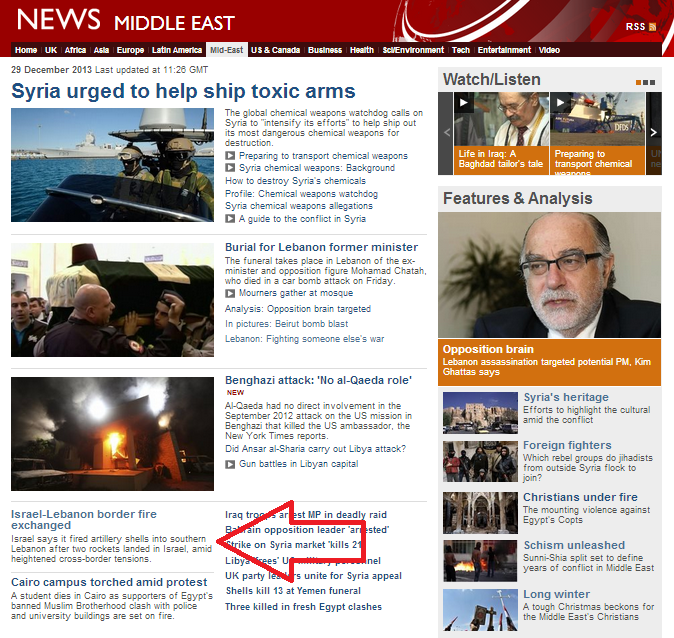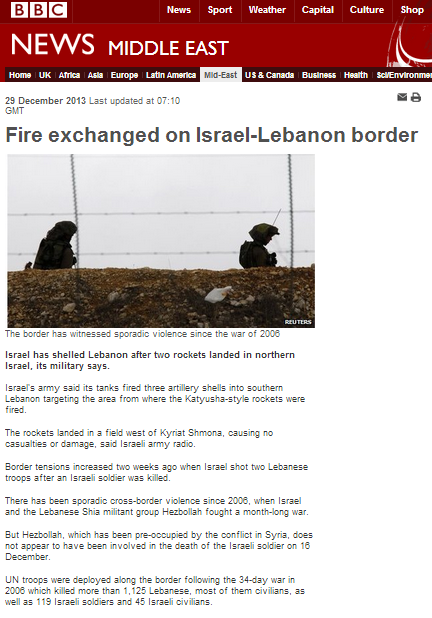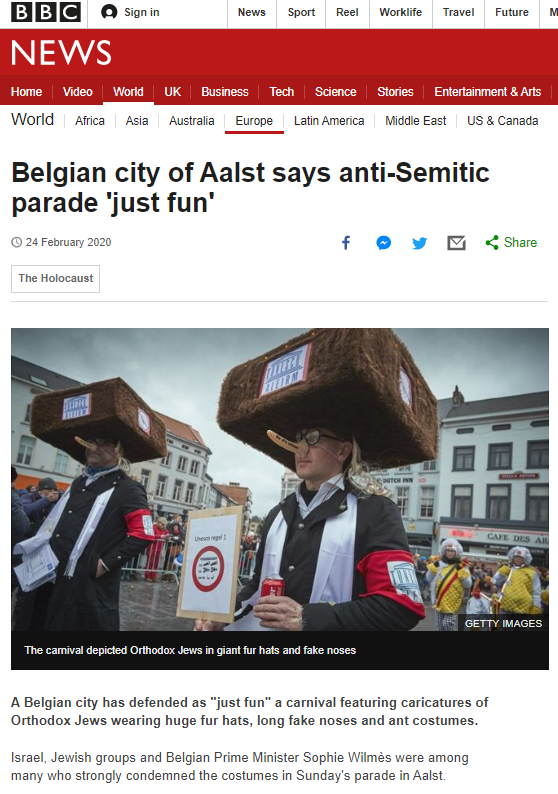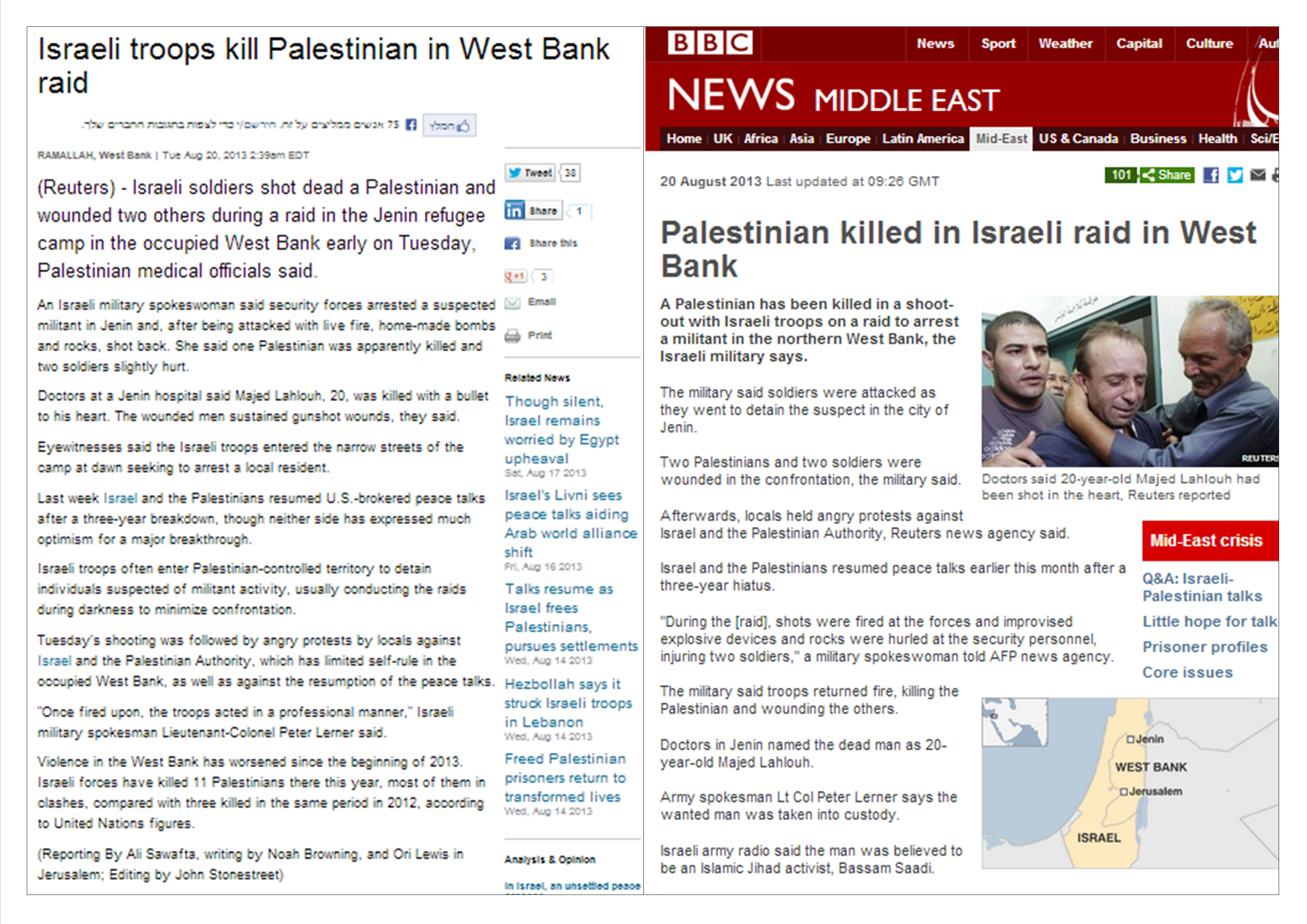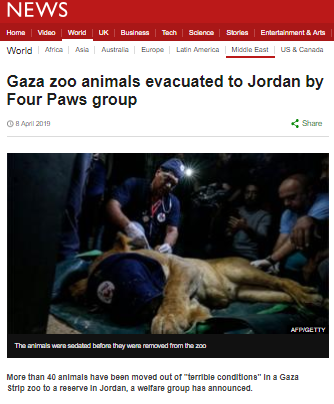At around 7 a.m. on December 29th, residents of Kiryat Shmona preparing for school and work suddenly had their morning punctuated by loud explosions. Some five missiles had been fired from nearby Lebanon, with one landing site having been found in open ground just west of the town and two missiles apparently having fallen short in Lebanese territory. 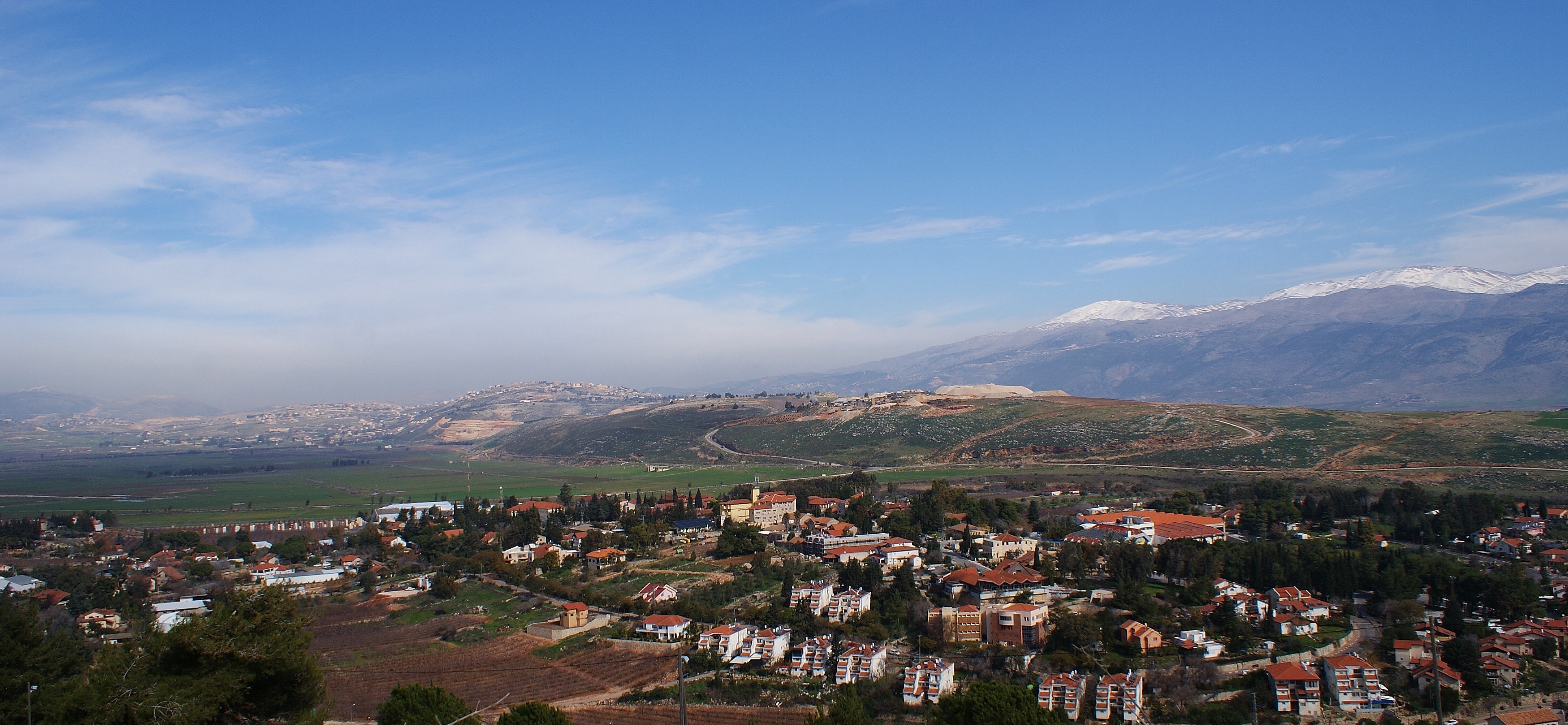
The IDF responded to the attack with artillery fire directed at its source near Marj Ayoun and lodged a complaint with UNIFIL.
So how did the BBC News website report that incident? Visitors to the Middle East home page saw the headline “Israel-Lebanon border fire exchanged” which of course gives readers no indication of which of the two parties mentioned triggered the incident or from where. The sub-heading read:
“Israel says it fired artillery shells into southern Lebanon after two rockets landed in Israel, amid heightened cross-border tensions.”
In other words, more ‘last-first’ reporting instead of a clear presentation to audiences of what happened first.
The link leads to an article with the similarly ambiguous, equivalence-promoting headline “Fire exchanged on Israel-Lebanon border“.
The caption to the unrelated photograph chosen to open and illustrate the article’s earlier version stated:
“The border has witnessed sporadic violence since the war of 2006”
Borders of course do not ‘witness’ anything – people do.
Another version of that statement appears in the body of the article:
“There has been sporadic cross-border violence since 2006, when Israel and the Lebanese Shia militant group Hezbollah fought a month-long war.”
That same misleading information was also promoted in another BBC report just a couple of weeks ago. As we noted then:
“Contrary to the impression created by the BBC, cross-border violence also occurred before 2006, with the most well-known example being the kidnapping and killing of Adi Avitan, Benny Avraham and Omar Sueid in October 2000.”
The report opens with more ‘last-first’ reporting:
“Israel has shelled Lebanon after two rockets landed in northern Israel, its military says.”
It goes on to produce even more of the same:
“Border tensions increased two weeks ago when Israel shot two Lebanese troops after an Israeli soldier was killed.”
Whether this convoluted fashion of writing stems from a simple inability to portray events in an easily comprehensible, straightforward manner or whether it is the product of some mistaken notion of clever ‘style’, BBC writers are clearly in need of help, so here is a suggestion of how that information could – and should – have been presented.
“Two rockets fired from Lebanon landed in northern Israel. The Israeli military stated that it had fired shells into Lebanon in response.”
“Two weeks ago an Israeli soldier was killed near the Lebanese border, increasing tensions in the area. Whilst investigating the incident, Israeli forces later shot two Lebanese troops.”
There; that wasn’t too difficult, was it?
Without informing readers of the basis for its speculations, the article goes on to claim:
“But Hezbollah, which has been pre-occupied by the conflict in Syria, does not appear to have been involved in the death of the Israeli soldier on 16 December.”
The report ends by erroneously stating:
“UN troops were deployed along the border following the 34-day war in 2006 which killed more than 1,125 Lebanese, most of them civilians, as well as 119 Israeli soldiers and 45 Israeli civilians.”
In fact, UN troops have been deployed in southern Lebanon since 1978 and successive UN Security Council resolutions (1559, 1680, 1701) have included clauses stating that militias operating in the area – primarily Hizballah – must be disarmed. UNIFIL has of course a long history of failing to carry out the part of its mission which should have prevented the massive flow of arms to terrorist groups in southern Lebanon and it hence incubated the conditions for the 2006 Second Lebanon War which was sparked by a cross-border attack by Hizballah combined with missile fire on civilian communities.
As is well known, since then UNIFIL has yet again failed to curb the flow of arms into the region and so Hizballah now has even greater stocks of weapons than it had in 2006. Those same UN SC resolutions state that only the Lebanese Armed Forces should be present along the border with Israel, but of course that has not been properly implemented either and the current crumbling state of the LAF makes implementation increasingly unlikely, meaning that Hizballah – which exercises significant control over the whole of southern Lebanon – has free rein to either make use of its beefed-up arsenal itself, or to allow the activities of other assorted actors.
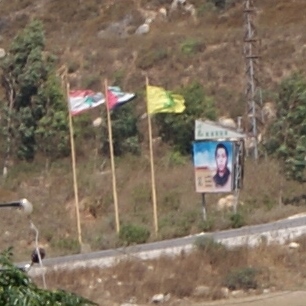
But apparently the BBC does not consider such background information relevant to its audiences’ understanding of the issue and instead prefers to promote false ‘they’re all as bad as each other’ equivalence.
Beyond the glaring and worryingly repetitious failures to meet editorial guidelines on accuracy evident in this article, it prompts another cause for concern. At no point in the report is it made clear to readers that Hizballah is an international criminal and terrorist organization financed and controlled by Iran which has created a ‘state within a state’ in Lebanon. Neither is it made clear that missile fire directed at Israeli civilian communities, be it carried out by Hizballah (which denied involvement in this latest attack) or by other groups present in the area, is an act of terrorism. Rather, the very transparent attempt to promote the notion of equivalence between missile fire by a terrorist organization and retaliatory fire by the defence forces of a sovereign country with an obligation to defend its citizens is all too apparent in this report.
One cannot but think back to the 2012 report commissioned by the BBC Trust on the subject of the BBC’s coverage of the ‘Arab Spring’ in which Edward Mortimer wrote (page 12):
“Equally,” the Guidelines go on to say, impartiality “does not require absolute neutrality on every issue or detachment from fundamental democratic principles.” This language originated as part of a Government amendment to the Broadcasting Act 1990, after concerns had been raised in Parliament that new detailed impartiality requirements might oblige broadcasters to balance any criticism of murderous regimes such as that of Pol Pot in Cambodia. […]
But how should this permission to stray from “absolute neutrality” be interpreted by BBC journalists? Not, surely, as authorising or encouraging them to espouse uncritically the perspective of the insurgents…”
Or, one might add, that of internationally recognised terrorists or any twopenny Al Qaeda-wannabe group which happens to have laid its hands on a few Grad missiles.
Related articles:
New resource on Hizballah gives information not supplied by BBC

